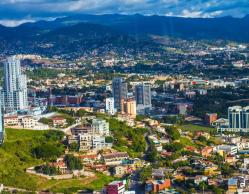You'll do this all with the nation's capital as the backdrop. You might work at CNN, the Canadian Embassy, the Department of Transportation, Amnesty International or even on Capitol Hill—the possibilities are endless. When you're not working or studying, spend time in the numerous museums of the Smithsonian Institute (all free of charge!) or find the exact spot where Martin Luther King, Jr. delivered his "I Have a Dream" speech. Just make sure to bring your walking shoes—you'll be glad you did.
Washington D.C. lies on the Potomac River and is bordered by Maryland to the northeast, northwest and southeast and Virginia to the southwest. Standing on centuries of national history, you will find yourself surrounded by monuments, performance halls, museums and of course the operational center of America's government.
Washington, D.C.
Washington D.C. lies on the Potomac River and is bordered by Maryland to the northeast, northwest and southeast and Virginia to the southwest. Standing on centuries of national history, you will find yourself surrounded by monuments, performance halls, museums and of course the operational center of America's government.
Things to do
There are too many important sites in Washington, D.C. to list, but make sure to take advantage of the free admission at most D.C. museums. Washington is also only an hour on public transit to Baltimore, Maryland.
Metrorail and Metrobus provide excellent transportation within Washington, D.C. and the surrounding metro area. Check out their routes to find out how you'll get from your housing location to your internship.
Given how much you'll have to walk, students say don't be afraid to wear sneakers or walking shoes with your internship attire on your way to work—everyone in D.C. does it.
History
Founded on July 16, 1790 by provision of the Residence Act, Washington D.C. was made to be the permanent capital of the United States. George Washington chose the site for the city that measured 100 square miles (today it measures only 68 square miles). The first phase of work began on the capitol in 1793 and was completed in 1826. Now a major metropolitan area, the city is the home to many of the nation's governing bodies including Capitol Hill, the Supreme Court, the Library of Congress, the State Department, the Justice Department and the Federal Bureau of Investigation.
Population
Approx. 658,900
Climate
Washington is in the humid subtropical climate zone and exhibits four distinct seasons. Spring and fall are warm, while winter is chilly with annual snowfall averaging 15.5 inches (39 cm). Winter temperatures average around 38 °F (3.3 °C) from mid-December to mid-February. Summers are hot and humid with a July daily average of 79.8 °F (26.6 °C) and average daily relative humidity around 66%.
Basic Information
Location
Washington, D.C.
Dates
Next offered: Spring Semester 2026
Cost
Course Info
Program Details
Students choose between four available program tracks which help them prepare for the semester during the preceding fall, assist them with identifying possible internship sites, and provide related mentoring and networking relationships during the spring semester (as part of STDC 342/SOWK 380 classes):
General internship program with four tracks: politics & policy, pre-law, strategic communication, or social work.
STDC 344: Internship in Washington, DC
STDC 343: Integrating Faith and Public Life: People, Policy, Principles
STDC 342: Special Topics in Public Life: Bureaucracy and Civil Service
Social work field work
SOWK 380: Social Work Field Assignment in Washington, DC
STDC 343: Integrating Faith and Public Life
You will live in apartment style housing in the Capitol Hill area, with easy access to nearby public transportation.
The final program cost is expected to be within $1000 of Calvin tuition and room and board on campus. More specific cost information will be sent with your acceptance letter. The final program cost is based on many factors and is not known exactly until the number of students in the group has been identified. The financial information page covers the details that go into the cost of the program and rough estimates for each. The cost for the Washington D.C. semester will include:
- Tuition
- Room and board
- Program-related cultural events
Additional expenses not included in the program cost: travel to and from Washington, D.C., books, independent travel and spending money.
Scholarships: Apply for scholarships to study in D.C. through the Financial Aid Office. Scholarships include:
- Paul B. Henry Semester in Washington, D.C. Scholarship
You must have achieved a minimum 2.5 grade point average to participate in the Washington, D.C. semester program. Please note that you do not need to a political science major to participate in the program.
If you're interested in participating in this off-campus program, click the button below for a checklist that will walk you through the application process.





















